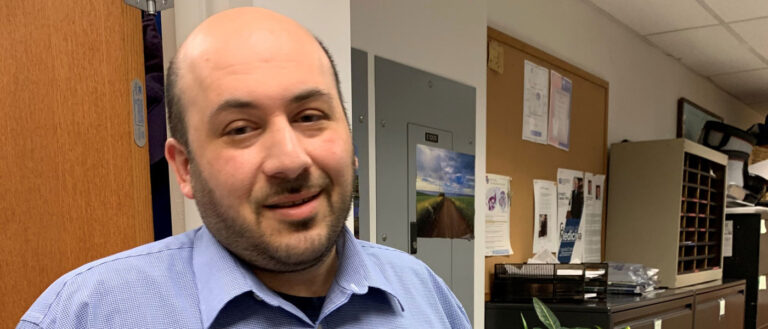The Case Western Reserve University community is mourning the loss of staff member Amad Awadallah, who died July 22. He was 50.
Awadallah got his start at the university as an undergraduate student in the fall of 1991. During that time, he worked as a work study student in the Caplan Lab, housed within the Skeletal Research Center in the College of Arts and Sciences, where he discovered his passion for histology, a branch of biology focused on the microscopic anatomy of biological tissues.
Following his graduation from the university in 1995, he obtained a full-time position in the lab as research assistant I—a role in which he quickly excelled and stood out as a histotechnologist, eventually advancing over the years to the level of research assistant III.
Most recently, Awadallah worked part time in the Caplan Lab and held a full-time position at Cleveland Clinic as a histology manager, where he worked with hundreds, if not thousands, of microscope slides weekly.
Awadallah’s work required him to take a piece of tissue, preserve it, and, in a highly skilled manner, cut a very thin section of that tissue, place it on a slide and stain it for the lab to further analyze.
”He was enormously skilled in what he did,” said Arnold Caplan, professor in the Department of Biology. “If you imagine cutting a salami into thin slices, this is what he did—but the slices were so thin you could hardly see them. It took a lot of time and … he was so skilled he could do hundreds of samples in a day.”
Caplan said Awadallah would receive phone calls and emails from people all over the country—and world—who would ask him for technical advice. And Awadallah, who had amassed more than 500 research paper acknowledgements and over 30 publications over the span of his career, was always happy to share his insights.
“I think he impacted the university because he brought unusual skills and expertise to his job,” Caplan noted. “And, because he [was] such a positive person, he shared that expertise with whoever asked a technical question. That’s what we pride ourselves on at the university is inventing new things and sharing them.”
Caplan, who worked with Awadallah in many capacities for more than 30 years, said he was the “perfect employee.”
“In all the years he was employed here—and he had a number of different supervisors and people he interacted with—I never saw a negative comment from anybody he [worked] with,” Caplan explained.
“Anybody in our world, anybody who is as thoughtful and kind and gentle [as he was] is already unusual,” he added. “I think he brought out the best in everyone he interacted with.”
Awadallah’s histology career at Case Western Reserve certainly came a long way since his undergraduate years. Caplan said back then, learning the process of how to preserve tissue and cut it in such thin sections was a technological nightmare—but Awadallah kept at it.
“One day, he came walking into my office and he said, ‘I got it, I just did 20 of those in an hour,’” Caplan recalled.
Awadallah leaves behind a loving family, including a wife and five children, and a host of friends and colleagues. Janazah prayers were held for Awadallah, a devout Muslim, on July 23 and interment took place July 26 at West Park Cemetery. Caplan said after the interment, a reception was held at Awadallah’s mosque and more than 300 people attended, many of whom were colleagues.
Students who would like support during this time are encouraged to contact University Health and Counseling Services at 216.368.5872. This line is staffed by a counselor 24 hours a day, seven days a week. Faculty and staff can access counseling at any time by calling IMPACT Solutions at 1.800.227.6007.

